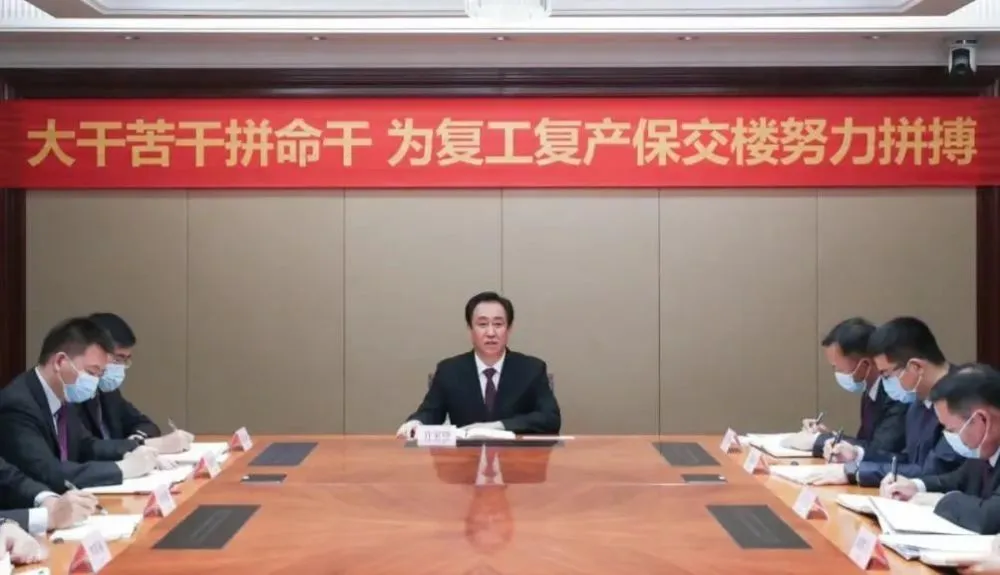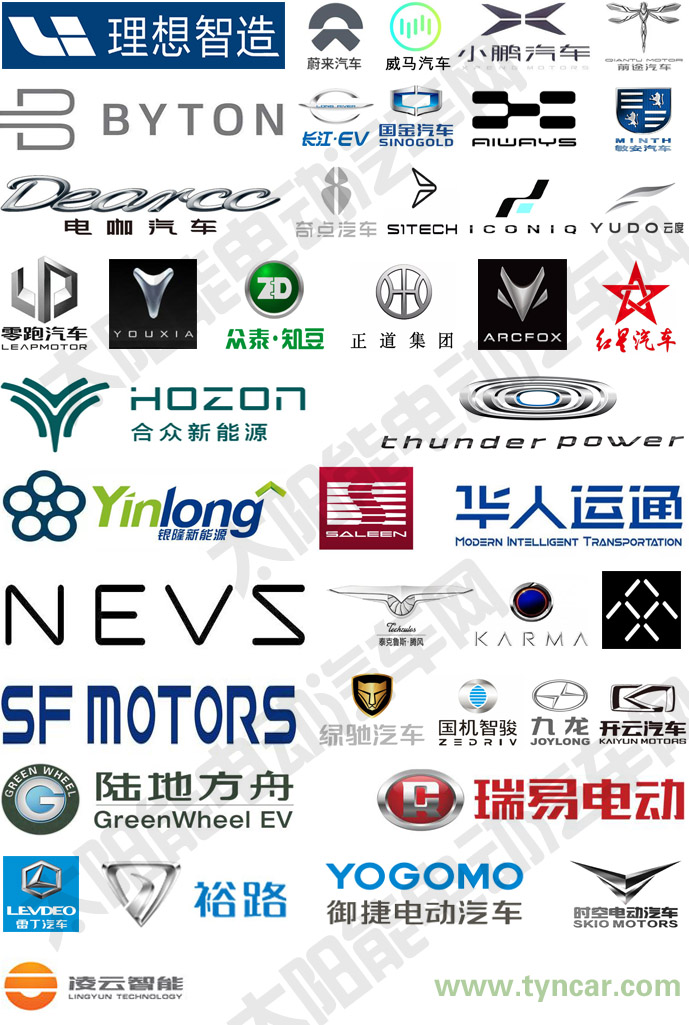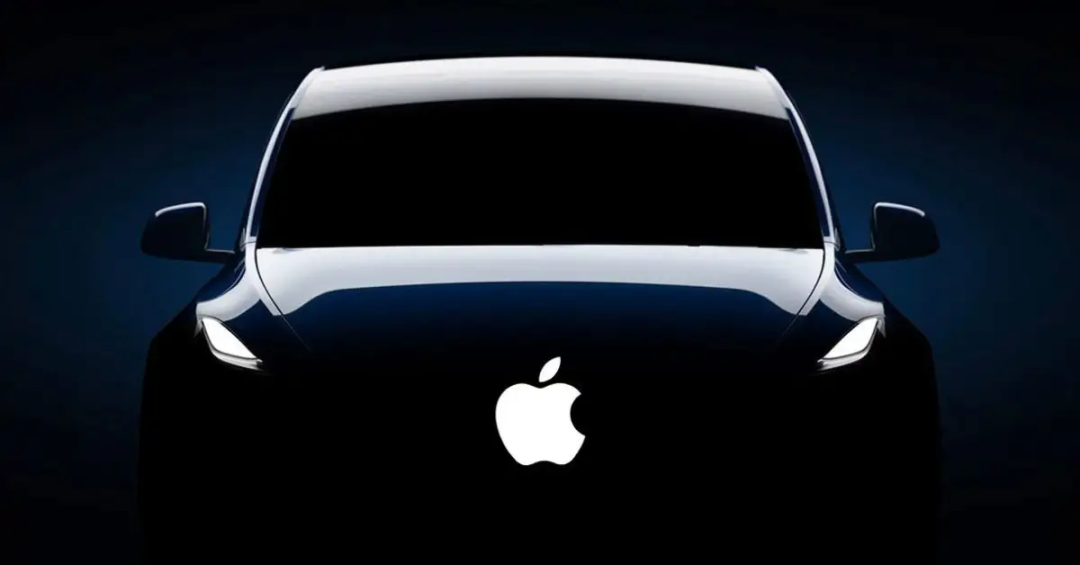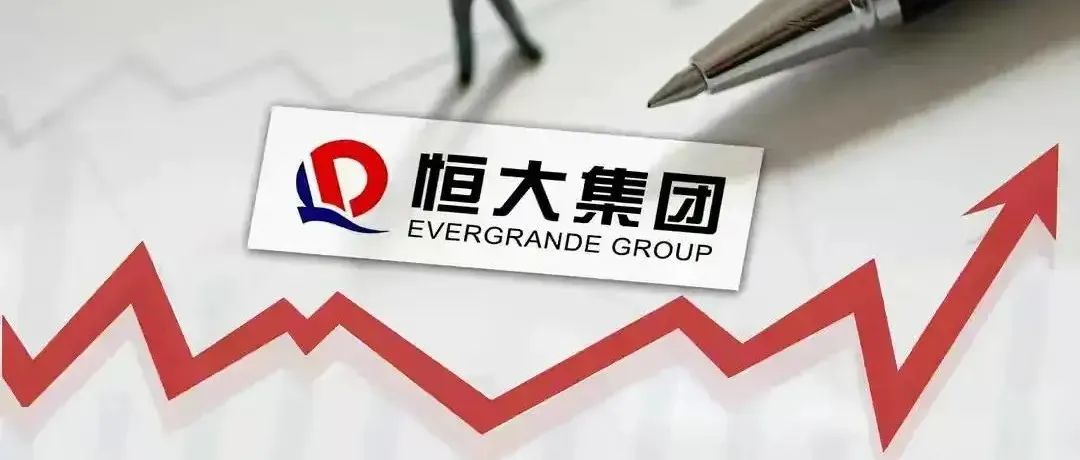Roomy
Translated by [Your Name]
On September 12th, Xu Jiayin made a public appearance and held a “Evergrande Resumption and Production Conference”. His complexion was better than expected. Wearing a black suit, tie, and his usual big back-combed hair, Xu Jiayin once again made a military pledge.
The important topic of the resumption of production conference was “保交楼,” which is the top priority for Evergrande to get out of trouble. In order to show determination, Xu Jiayin also hung a banner above the venue, with 19 large characters, “Work hard, fight hard, and strive for resumption of work, and ensure the delivery of the buildings.”
According to Xu Jiayin, there are currently 668 projects that have resumed work, 606 of which have reached normal construction levels, and 62 are in the process of returning to normal construction. In addition, there are 38 projects that have not yet resumed work, and Xu Jiayin has requested that they resume work by September 30th. It was truly an imposing posture that he could not let the government down for helping to tide over the difficult times.

Onlookers who were happy about the situation predicted the time for Xu Jiayin and found that only 18 days remained to complete all the projects, which was not easy.
However, no matter how loud the slogan is shouted, many people still refused to pay. “Stop shouting slogans, come back when you have paid for the project and the house.”… fearing that the bankrupt Xu still plays an “act-like resumption of work” again. After all, since last August, Xu Jiayin has often played such a scene.
The reason for the ridicule of the slogan of “work hard and live up to the commitments” is actually the concern and mistrust of Evergrande’s industrial chain. Not to mention the current downturn in the real estate industry, let’s talk about Evergrande Auto. How much money does it still owe to suppliers? Even the “small amounts” owed to various media outlets have not been settled.
Furthermore, in order to fill the hole, Evergrande Auto not only sold its shares but also returned the land use rights one after another. Among the undeveloped lands acquired by Evergrande Auto, the 14 undeveloped lands, including the famous “Lotus” stadium, must be returned.
This is still just a drop in the bucket for the 2 trillion yuan of hidden debt of Evergrande. Moreover, the Evergrande scandal has fueled the curiosity of the audience, who are no longer interested in mere million dollars, of course, this is a joke.
What puzzles the industry insiders is, with what does Xu Jiayin “work hard”? One speculation is that Xu Jiayin’s current focus is on “保交楼,” and as a new energy car maker in the real economy, he is expected to release some funds as the source of “保交楼.”
In other words, Evergrande Auto, which has produced its first production model, Hongguang MINI EV, will face huge delivery problems. Although in March this year, at Evergrande’s global creditor conference call, Evergrande Group proposed that Evergrande Auto is mobilizing all resources to ensure the production and subsequent sales of Hongguang MINI EV.
Can Evergrande Group successfully deliver the Evergrande 5, originally planned to be delivered in October, under the “delivery guarantee” contract? No one knows how many cars will be sold in the market, no one believes it, even the suppliers in the industry chain.
“The successful delivery of Evergrande 5 is related to whether I can get my money back,” is the voice of many media colleagues. Media is just the tip of the iceberg in the automotive industry. The real “disaster” is the upstream and downstream supply chain that suffers huge losses or even bankruptcy due to the vigorous car-making movement.
“Do we rob temples and enrich ourselves?”
Regardless of whether you understand or don’t understand Xu Jiayin’s personality, you have heard of him to some extent during the more than a year since the Evergrande Group defaulted. Many people describe him with five words: daring to take risks and gamble.
A former colleague said that his courage is like that of Xiang Yu, willing to burn the boats and break the cauldrons. In 1996, with only 6 million in funds, he founded Evergrande, but he dared to use everything to leverage one billion for a piece of land.
“Others do as much as they have money, Xu Jiayin has two dollars in his pocket, but he wants to do twenty dollars worth of work, nothing can stop him.” Pang Gang, former general manager of Bank of America Merrill Lynch’s real estate investment department, China region, pointed out Xu Jiayin’s style of dealing with things.
Familiar with the rules but not playing by the rules, Xu Jiayin has his own set of logical thinking. During the years he has been in charge of the Evergrande Group, there is one clear word that he believes in: “speed”. He believes in speed, which is his killer in the market.
His radical spirit is not limited to real estate, but also to sports and new energy vehicles. I believe that many people will not forget the time when Evergrande Auto emerged. Xu Jiayin proposed a “buy buy buy,” “merge merge merge,” and “circle circle circle” strategy, which was truly extravagant.
Xu Jiayin’s previous experience told him that as long as there is speed, miracles are possible. He thought that he could do the same in the field of car-making. When new car-making forces were just emerging, Li Bin said that 20 billion yuan was the threshold for entry. Xu Jiayin, who was rich and powerful, said he wanted to invest 300 billion yuan to build cars.
Talking about the past is really impressive, but now, when it comes to Evergrande Auto, it is really regretful. It is not regretful for Evergrande Auto itself, but for the waste caused by some “car-making groups” represented by Evergrande Auto.
In recent years, there have been countless stories of nothing.
Do you still remember that when you went to Jiangxi and Jiangsu in 2019, you witnessed the grand layout of new energy vehicles and saw the desolation of the last resort. Outsiders involved in the automobile industry promised to invest, but then closed down and ran away, and were held accountable by the government. The story always seems similar, but unexpected.
In Jiangxi, where the industrial chain foundation is weak and resources are scarce, people hope to build high-rise buildings on level ground, and are eager to overtake on the bend to become the new “Detroit of China”. Jiangsu, which ranks second with a GDP of 9.9 trillion yuan and has Guangzhou Automobile Group and industrial chain layout envy Guangdong Province for ranking first by GDP, and also urgently hopes to open up new channels.
To win, they have all made heavy bets.
Like Xu Jiayin, who pursues speed, the great leap forward-style automobile manufacturing movement he launched has exposed more flaws in the fierce market environment. I still remember the brand-new door of the BYD factory covered with sealing tape. I haven’t forgotten the Bojun automobile, who owes more than 1,000 yuan in express delivery fees and has all the supply and production issues, standing in an old and broken trial manufacturing workshop. “The government was deceived by Saicin for tens of billions of yuan…”
The reasons for the collapse are all different.
But what is the same is that most of the funding comes from the government, capital, etc., and these self-entering automobile manufacturers do not have to be “all-in”. This also explains why when the dam bursts, the “big talkers” in these automobile manufacturing movements always leave unscathed, leaving only employees who cannot get paid, suppliers who are petitioning for their rights, factories and land that have been greatly wasted, and local governments that have to deal with aftermath.
These are the plot that we are used to seeing, “the temple collapses, and the abbot fattens”.
A venture capital big shot once said, “Real prosperity often comes after the bubble bursts. To some extent, the bubble is the way we move forward.” However, the scars behind the bubble, bankruptcy, and unemployment, and the frequency of similar events happening are really too many.
“They have no choice”
It is well known that the explosion of Evergrande is all-around, so the affected industrial chains are not only in the automotive industry. In the very important real estate sector of Evergrande, many upstream enterprises in the supply chain have gone bankrupt.
For example, in July this year, the downstream company Guangtian Group held an IOU of 3.2 billion yuan without any hope of collecting the debt. Since the Evergrande crisis, Guangtian Group has also fallen into a financial crisis, accumulating 2.6 billion yuan in debt to banks and being sued by downstream, with more than 50 million yuan in assets being forcibly executed.
Enterprises and supply chains have always been interdependent and share weal and woe. This law is true in any industry sector and any era.In the era of traditional fuel vehicles, the upstream and downstream of the supply chain often experience debt collection and financial disruption due to some reasons of the automakers. For example, in 2019, as a star enterprise in the supply chain, Guowei Technology, a supplier of many automakers, went bankrupt due to a capital chain problem with a debt of 1 billion yuan.
The reason for the collapse of Guowei Technology is the dual problem of management and transformation, while the cause of the capital chain rupture is the declining orders and extended payment periods, which is a reflection of the situation encountered by local auto parts companies.
The general manager of a parts company in Anhui once stated that “many of them were dragged to death by the automakers’ delayed payments, and Guowei Technology is not the first to fall and will not be the last.” Even internal staff directly pointed out that “Geely not paying caused the trouble.”
This is not an uncommon thing for Guowei Technology. Around the time when Guowei Technology went bankrupt, a parts company that produces car body sheet metal parts for Dongfeng Yulong and Zotye Motors also suffered from business interruptions.
On the one hand, some automakers were eliminated in the competition, leading to the wave engulfing the suppliers. Another main reason is “being dragged to death.”
Currently, most supply models involve a triangular relationship. Automakers owe suppliers money, and suppliers owe raw material companies money. Contract payment periods adopt 3+3 months or 3+6 months acceptance bills, which undoubtedly increases the financial pressure on auto parts companies.
The accessories of a car can easily cost tens of thousands of yuan, and the suppliers involved are divided into multiple tiers, including Tier 1, Tier 2, and Tier 3, which are interdependent and interact with each other, leading to an unhealthy supply chain ecosystem.
In the era of intelligentization, the situation of mutual squeeze has not improved.
On the one hand, with the transformation of the automotive industry, the supply chain must also accelerate its transformation. Recently, international parts suppliers are facing a wave of bankruptcies. The German wire harness giant Leoni had a debt of up to 1.5 billion euros in the first half of this year and faced bankruptcy liquidation. In the first half of this year, a total of 3,060 companies in Japan applied for bankruptcy or debt restructuring.
On the other hand, the speed of development of intelligentization and electrification has led to an explosive increase in the price of raw materials. For example, since 2020, the price of lithium has soared from 40,000 yuan/ton to 500,000 yuan/ton, which is an extremely crazy increase.Due to the increase in raw material prices, cost pressures cannot be balanced. According to a survey by IHS Automotive Research, the relationship between vehicle manufacturers and parts suppliers has further deteriorated, and the pressure to reduce costs is increasing.
“Currently, the cost of power batteries accounts for 60% of the total cost of automobiles. Aren’t we working for CATL?” complained Zeng Qinghong, chairman of GAC Group at the 2022 World Power Battery Conference. The price of power batteries is too high, and most new-energy vehicle companies are in a loss-making state.
However, Zeng Yuqun, chairman of CATL, stated that “capital speculation on upstream raw materials has brought short-term troubles to the power battery industrial chain. Lithium battery upstream materials such as lithium carbonate, lithium hexafluorophosphate, and petroleum coke have all experienced price surges.”
At present, parts companies with significantly increased net profits are mainly related to new-energy or intelligent network-connected components. Other traditional suppliers are still facing significant financial pressures.
“Compared with the time of traditional fuel vehicles, new electric vehicle brands emerge quickly, but they also disappear quickly. Battery giants like CATL can demand payment first. Our small factories cannot be so dominant and live on, sometimes we have to see whether the new brands survive,” said a supplier in Jiangsu.
Large suppliers such as CATL, Baidu, Adient, Bosch, Continental, and Amphenol are on the supplier list of Evergrande Auto. Previously, insiders said, “all large suppliers are unwilling to cooperate with Evergrande, if they negotiate with Evergrande, they will ask for full payment first.” Because they are not optimistic about Evergrande Auto’s delivery, they are afraid of giving goods and not receiving money.
The first car created by Evergrande, the Hengchi 5, wants to achieve a smooth delivery in October. Having the slogan “hard work and hard work” is not enough, money is also necessary. Currently, Xu Jiayin is still in a difficult situation, with his partners turning against him and his subordinates leaving him. Looking at the first-tier suppliers, Evergrande Auto lying in the ICU cannot get any benefits.
However, the second- and third-tier suppliers, whose bargaining power is weak, don’t have much choice. “We don’t want to deliver goods, but we can’t not do it,” said the supplier, and this is not just for Evergrande Auto, but for all new entrants in the automotive industry.
Because they don’t have a choice.
The automotive industry, never lacking in newcomers
“We are afraid of more new brands, unless there is a group behind them,” said the supplier in Jiangsu.
However, even though the automotive industry has experienced many lessons in recent years, the racecourse for new car production is still full of people, as evidenced by the launch of Huawei and Cyrus’s AITO brand, with the Wanjie M5 and M7 models being released one after another, with sales and momentum soaring. Data shows that in August of this year, sales of the AITO brand exceeded 10,000 units.To gain a foothold in the intelligent racing track, there are still many who are trying.
At the beginning of this year, the official blog of Tuandache, a Chinese online car dealer, declared, “In 2022, we are going to launch our own cars! Do you think it’s too late?” and tagged NIO, Li Auto, and XPeng.
The CEO of Tuandache, Wen Wei, said that their team of 100 experienced professionals could manage almost every step of the car-making process from product planning to supplier management, making cars worth more than 20 million RMB or cars worth as low as 50,000 RMB. However, Li Xiang, the founder of Li Auto, criticized Tuandache as “fraudsters” and went on to say that they “have crossed the bottom line of entrepreneurship.”
At the end of last year, Li Yinan, the founder of Xniu Electric, announced the establishment of a new company, Ziyoujia, and launched its first car model, Ziyoujia NV. In an interview with the media, Li Yinan confidently stated that they have full control of their car-making plan, and that they had not been lazy even for a single day during their three and a half years of car-making.
Huang Hongsheng, the founder of Skyworth Group, personally endorsed “Skyworth Automobile.” He said, “In order to make Skyworth a brand that integrates home appliances and cars and has an influence everywhere, I am willing to work hard for another 30 years!”
Such stories keep popping up. People in the industry are enthusiastic and seem to ignore Great Wall Motors’ predicament and the fact that Yao Zhenhua put Baoneng in danger due to his dream of building cars.
Some onlookers think to themselves, “Oh great, another brand I don’t know,” while others in the upstream and downstream supply chain think to themselves, “Great, another customer,” or “Ugh, another brand trying to cash in.”
Before discussing Great Wall Motors’ crisis, Cao Dewang, the chairman of Fuyao Glass Group, once said, “Xu Jiayin (founder of Evergrande) had only 3.9 billion RMB of personal capital, but he was able to get loans totaling 20 trillion RMB.” The logic behind this is actually quite similar to the craze for building cars. Many people, like Xu, have a gambling mentality. As Zhou Hongyi (the founder of 360 Security) once said, “If Lei Jun (founder of Xiaomi) can do it, why can’t I?”
Cao Dewang has been in the automotive supply chain system for many years and is well aware of the ups and downs of the industry. In his view, “The correct and rational approach is to take one step at a time, accumulate gradually, create dividends, or wait for the market to give dividends, instead of relying on hype and blind gambling.”
Tesla, NIO, and Li Auto have all overcome various challenges and difficulties to build their businesses. Those who cannot withstand the pressure, however, can only choose to quit or pause.
Dyson, who spent a huge amount of money to build cars, eventually failed. Founder James Dyson wrote in an email to his employees, “I cannot see a way to make it commercially viable.”#

This January, Joe Bust, the Software Engineering Project Manager of the Apple car team, left the company after seven years of service. With Bust’s departure, almost the entire Apple car management team left, and the project was not progressing smoothly.
Building cars is like playing “Huarong Road” game, the space for maneuvering is getting smaller and smaller. Not everyone has the luck of Huawei’s Ren Zhengfei, and Xiaomi’s Lei Jun has stated on various occasions that Xiaomi will face this new journey with huge investment, profound respect, and enduring patience.
“In the past 500 days, I have gained a deeper understanding of the automobile industry. I always believe that making cars must be done with a respectful heart. Cars are very complex, and it is absolutely essential not to rush things.” In his public speech in August, Lei Jun said that in the next two years, he is not going to refute rumors and will periodically report on the progress at an appropriate time.
Some parts suppliers have expressed their appreciation for Lei Jun’s attitude. Because for the entire automobile manufacturing ecosystem, every link on the supply chain is crucial and complementary. Only by having a respectful attitude towards the market and enduring loneliness can there be a virtuous cycle.
Or, as Musk said, “this is the hardest way to make money that you can possibly imagine.” Hopefully, Evergrande Auto can become a warning bell in the automobile manufacturing industry.
This article is a translation by ChatGPT of a Chinese report from 42HOW. If you have any questions about it, please email bd@42how.com.
